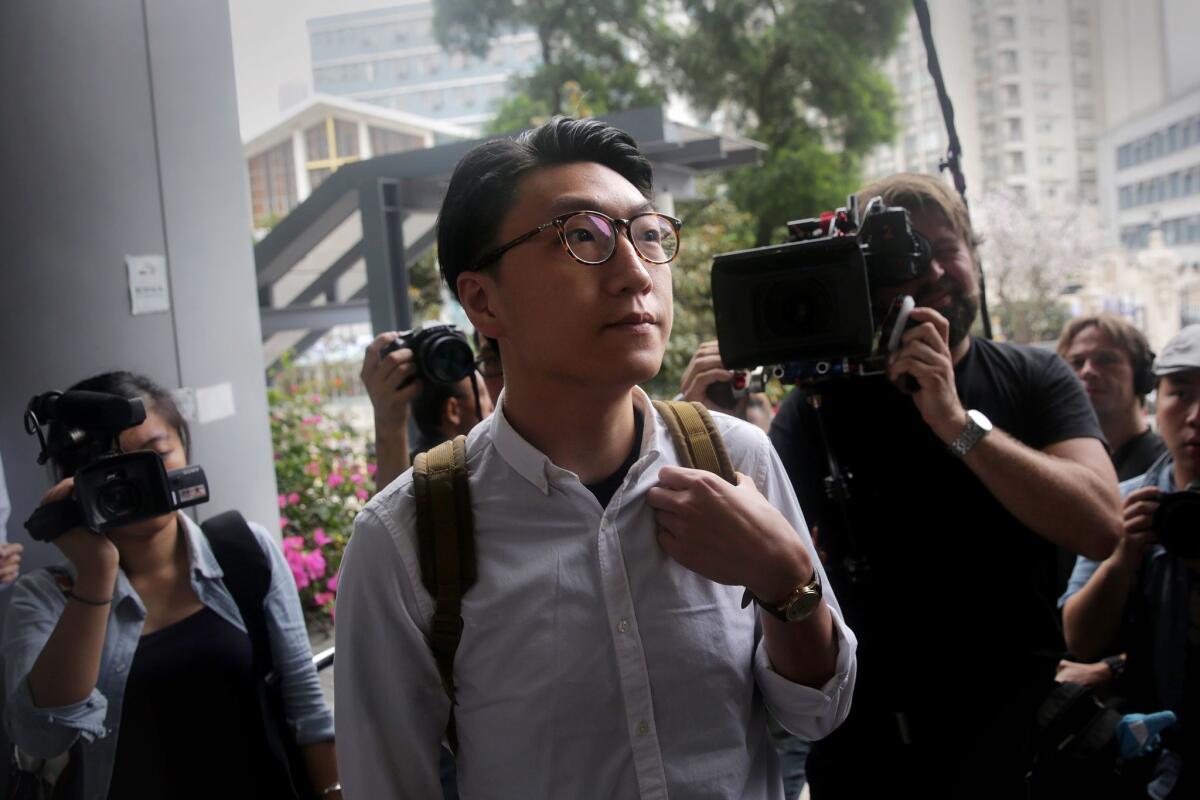A growing political force in Hong Kong: the localists

Localist Edward Leung arrives in court in April to face charges of rioting after Hong Kong officials tried to clear illegal street hawkers from the busy commercial neighborhood of Mong Kok.
- Share via
Reporting from Beijing — Hong Kong has been rocked by a new generation of activists who stake their future in the former British colony turned semiautonomous Chinese territory.
Known as the localists, the activists bristle at Beijing’s meddling and what they see as their government prioritizing Communist Chinese Party mandates over local concerns.
They have emerged as a social and political force in recent months, ending a police crackdown on street food vendors and taking 13% of the vote in a recent race for a seat in Hong Kong’s legislature.
“When people hear we’re localists, they immediately think we’re troublemakers,” said Kwong Po-yin, an emergency room doctor, local politician and member of the recently formed political party Youngspiration. “Of course we aim to rock the boat because we want to make our society better.”
Who are the localists?
Some are preservationists who rally against the destruction of colonial British heritage sites. Others are environmentalists who defend dying villages against the juggernaut of developers. A few are legislators who have shored up their base on the platform that the interests of locals come first. Many more are pro-democracy agitators who hope the populist banner would help broaden support for their cause.
Politically, they span a wide spectrum — from legislators from the so-called pan-democratic camp who condemn the use of violence to militant secessionists who vow to advance their agenda “by any means necessary.”
What they share is a vision of the future in which Hong Kong parts ways with mainland China.
Most attribute Hong Kong’s social woes to the lack of a fully democratic government. Unlike their parents, few harbor hopes for a democratic China, so they increasingly see separation as the only feasible way out.
What are the localists’ demands?
Localists of varying stripes all say they take aim at government policies that serve the interests of Beijing rather than Hong Kong.
Many of their causes — including the rule of law and the protection of civil liberties — resonate with a population that sees Hong Kong’s core values as being under threat.
Although localists say they welcome anybody who adapts to the culture of Hong Kong — where 38% of the 7.3 million residents are immigrants — some accuse newcomers from the mainland of depleting scarce resources. Localists have heckled mainland tourists and protested against the teaching of Mandarin in grade schools. Mandarin is spoken on the mainland while Cantonese is spoken in Hong Kong.
At the very least they believe in their right to self-determination. Some advocate for independence.
“We think independence affords the best protection for our freedoms,” said Marcus Lau, a University of Hong Kong sophomore who last month edited a campus magazine issue devoted to the territory’s prospects as an autonomous state.
Why do the localists think they have a case for self-determination, or even independence?
Hong Kong reverted to Chinese rule 19 years ago under a provisional framework known as “one country, two systems,” in which the territory was promised a high degree of autonomy until 2047, when it is to be governed under one system: communism.
The localists have reached into history and learned what they were never taught in school: In 1960, the United Nations passed a resolution that included Hong Kong on a list of dependent territories entitled to self-determination and independence. It was removed from the list in 1972 under pressure from China, which had just gained recognition as a member nation.
Why are the localists gaining strength?
Two years ago, the pro-democracy Umbrella Movement failed to win the right for Hong Kong residents to elect a leader who did not have to answer to Beijing. The appeal of the localists has been spreading since.
“They have created a kind of ‘Hong Kong nationalism’ to counteract the nationalism that Beijing has tried to impose on Hong Kongers,” said Alan Tse, a Chinese University of Hong Kong researcher who has studied the rise of localism.
Some localists believe that one way to change the government is to join it. Several are gearing up for the Legislative Council race this fall.
How has Beijing responded?
Communist Chinese officials have condemned militant localists as separatists, a label typically reserved for enemies of the state.
At a public address in Hong Kong in March, an official from China’s Foreign Ministry said “some radical groups are making waves under the localist banner … and planning to organize themselves into political parties. The separatism idea is metastasizing.”
“Beijing is feeling the pinch, and the dilemma,” said Dixon Ming Sing, a political scientist at the Hong Kong University of Science and Technology. “It wants to nip [independence] in the bud, yet Hong Kong’s system affords the freedom of speech to broach the subject.”
“This is a very delicate and potentially dangerous situation,” he said.
Law is a special correspondent.
More to Read
Sign up for Essential California
The most important California stories and recommendations in your inbox every morning.
You may occasionally receive promotional content from the Los Angeles Times.










